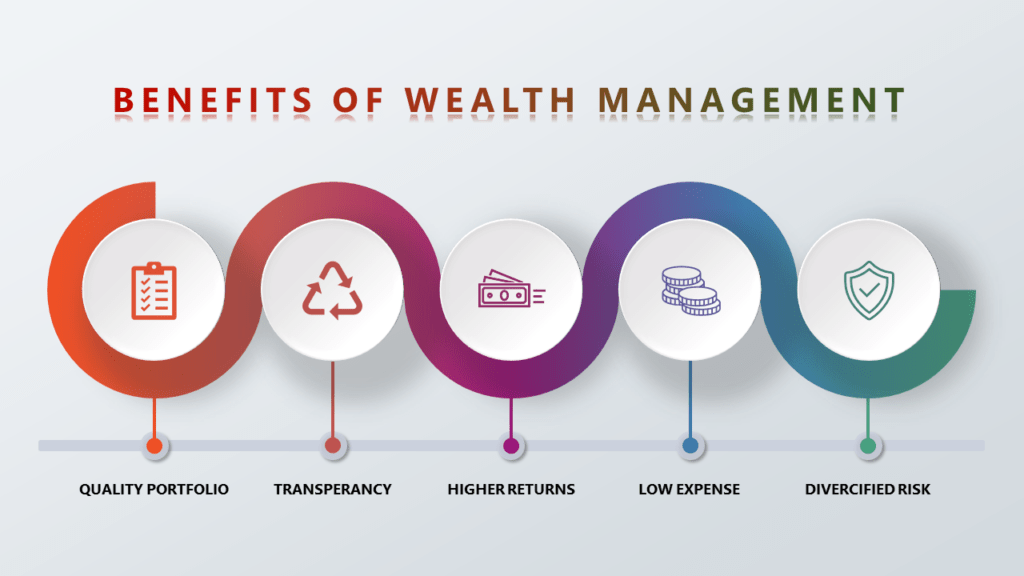Ditch the Suit, Rock the App: Demystifying Digital Wealth Management! Gone are the days of stuffy offices and hefty fees!
Discover how digital wealth management empowers YOU with tech-driven tools, personalized insights, & financial freedom. Explore the future of investing, one tap at a time!
For decades, digital wealth management was an exclusive realm reserved for the affluent, leaving the rest of us with limited options like stashing money in savings accounts with dismally low interest rates.
Digital wealth management is a new and innovative way to manage your wealth. It uses technology to provide personalized investment advice and automated portfolio management.
However, the financial landscape is transforming with digital wealth management, making saving and investing accessible to people of all backgrounds and budgets.
Learn more about what digital wealth management is and how it can help you achieve your financial goals in this informative blog post.
What Is Digital Wealth Management?

At its core, digital wealth management, often called robo-advisory, represents a seismic shift in the finance industry. It harnesses the power of technology to provide automated, algorithm-driven financial planning and investment services.
These services cover a wide spectrum of financial products, including savings plans that invest in stocks, exchange-traded funds (ETFs), digital assets, and even do-it-yourself platforms where investors can curate their portfolios.
The central theme here is using technology to offer solutions that assist clients in managing their wealth and growing it for the future.
The Rise of Digital Wealth Management

In the past, the world of wealth management was an exclusive club reserved for the affluent elite who had the privilege of personal financial advisors and access to traditional banking institutions.
These advisors relied on their experience, intuition, and connections to navigate the complex world of investments and financial planning.
For the majority, standard savings accounts, which in many countries paid pitiful interest rates, seemed to be the only viable “savings” option.
However, the financial landscape has experienced a remarkable transformation with the advent of digital wealth management.
This revolutionary approach to managing wealth makes saving and investing simple and accessible to people of all demographics and income levels.
Let’s delve into the rise of digital wealth management to fully understand how it’s reshaping how we approach our financial futures.
A Glimpse into the Past of Wealth Management
To truly appreciate the significance of digital wealth management, it’s important to reflect on the traditional wealth management landscape. In this conventional realm, access to professional financial advice and wealth management was primarily the privilege of the wealthy elite.
These individuals had personal financial advisors who guided them through investment decisions, while the rest of the population had limited options for managing their finances.
The services of these advisors often came at a steep cost, excluding the average person from the benefits of professional wealth management.
The Digital Revolution of Wealth Management
In contrast, digital wealth management is a testament to the power of the digital revolution. It leverages cutting-edge technology to make comprehensive financial planning and investment services available to a broader audience.
No longer restricted to the privileged few, these digital platforms provide an accessible and cost-effective way for individuals to grow their wealth, irrespective of their financial status.
How Does Digital Wealth Management Work?

Let’s delve deeper into how digital wealth management works:
- Client Profiling: The process begins with the client providing information about their financial goals, risk tolerance, investment horizon, and any specific preferences they may have. This information is crucial for tailoring investment strategies to meet clients’ needs.
- Algorithmic Analysis: Digital wealth management platforms often use improved algorithms and data analysis to assess the client’s profile and risk tolerance. These algorithms can then recommend a diversified investment portfolio based on the client’s objectives and risk preferences.
- Portfolio Construction: Once the client’s profile is analyzed, the platform constructs a portfolio that typically includes a mix of assets like stocks, bonds, ETFs, and sometimes digital assets like cryptocurrencies. The goal is to develop a well-balanced portfolio that aligns with the client’s risk tolerance and objectives.
- Automation: Many digital wealth management services offer automated portfolio management. Once the portfolio is set up, the platform monitors it continuously and adjusts as needed to maintain the desired asset allocation. This is done without requiring constant input from the client.
- Regular Reporting: Clients receive regular reports and updates on their portfolio’s performance. These reports may include information on gains, losses, asset allocation, and overall portfolio health. The frequency of reporting can vary among platforms.
- Client Control: Some digital wealth management platforms offer client control, allowing individuals to make specific investment choices or adjust their asset allocation. This can appeal to clients who want more hands-on involvement in their investments.
- Access to Information: Clients often have access to a wealth of information and educational materials through the platform. This can include market insights, investment research, and tools to help them make informed decisions.
- Mobile Accessibility: Many digital wealth management services have mobile apps, making it convenient for clients to manage their investments on the go.
- Fees and Costs: While digital wealth management platforms tend to have lower fees than traditional wealth management services, clients should be aware of any management fees or other charges associated with their chosen platform.
- Regulation and Compliance: Digital wealth management platforms are typically subject to financial regulations in their regions. This can include requirements related to client suitability assessments, data security, and transparency.
- Risk Management: Regardless of the platform’s automated features, clients should always be aware of the risks associated with their investments. Diversification and risk mitigation strategies are implemented, but no investment is entirely risk-free.
- Continuous Monitoring: As financial markets evolve, digital wealth management software continuously monitors market conditions and adjusts investment strategies accordingly. This adaptability helps ensure that portfolios remain aligned with clients’ goals.
Digital wealth management is a technology-driven approach to investing that combines client profiling, algorithmic analysis, portfolio construction, automation, and ongoing monitoring.
It aims to provide investors with easy access to professionally managed portfolios tailored to their financial objectives and risk preferences.
Clients can enjoy the benefits of diversification and professional management without the high barriers to entry often associated with traditional wealth management services.
However, individuals considering digital wealth management should conduct due diligence, understand the fees involved, and carefully assess whether it aligns with their financial goals and preferences.
Why Is Digital Wealth Management Important?
The term “digital wealth management” actually refers to the numerous digital technologies that financial advisors can use to provide unified experiences across all of their user devices and platforms.
Although many advisors may think that digital wealth management is what robo-advisors perform, this is not the case.
The utilization of financial technology, large amounts of data, artificial intelligence, and risk management are all components of digital wealth management.
This allows financial advisers to provide their clients with the highest possible level of service.
The technologies enable advisors to improve their performance with the financial assets that they manage, as well as their interaction with their clients, their transparency, and their collaboration with one another.
The following are some other ways in which digital wealth management might be of use to advisers and the customers they serve.
1. Democratizing investing:
Investing is now more accessible to clients of all ages and income levels. Most members of Generation Y and Generation Z are introducing themselves to the world of investing through the use of robo-advisors.
After gaining some experience, these investors are beginning to transition to traditional advisers to receive more individualized care.
This shift is occurring at a time when traditional advisors are also increasing their level of digitization, which is something that appeals to younger generations.
2. The transmission of wealth across generations:
The massive wealth transfer is anticipated to involve the transfer of trillions of dollars first between couples and subsequently to the progeny of those marriages.
Embracing digital wealth management, advisors not only have the ability to keep closer tabs on the assets they are managing, but they also have the opportunity to increase their chances of keeping clients’ wealth even as it is passed down from one generation to the next.
Keeping up with the most recent developments in technology and industry trends enables financial advisers to demonstrate to the next generation that they are capable of meeting the more individualized requirements of this generation.
It will be essential to demonstrate that fact when this industry is interviewing potential advisors.
3. Price Increases:
Digital asset management can assist financial advisers in tracking what is happening and providing more realistic models for how they may address their clients’ worries as interest and inflation rates continue to rise and market volatility increases. Clients’ assets are being devalued as a result.
Clients, particularly newer and younger ones, will be looking for it—and frequently wanting to check for themselves—to see how they are enduring the storms, and the new technology can enable them to do that to serve their needs better.
4. Investing in specialized areas:
Whether it’s cryptocurrency or environmentally responsible investment, clients are asking their advisors for more specific data on various topics.
By embracing digital wealth management, companies gain access to new technologies that enable them to achieve this, which enables them to demonstrate their level of expertise and share it with their clients in a more real-time manner.
This technology enables advisers to stay informed about customer segmentation as the industry transitions to a more personalized model, whether it’s through environmental, social, and governance (ESG) scores or a report on how a modest crypto allocation is performing in a portfolio during the exchange’s bankruptcy.
5. Simple and quick signup:
As more customers have gotten familiar with digitization, they have also become more comfortable with the idea of supplying their data online and even changing it, as well as other conditions that financial advisors may find helpful when working with them.
Many of the companies that specialize in financial technology are working to improve their capabilities in this area so that it will become even simpler to upload and update the information.
This will allow financial advisors to become more aware of things that may change in their clients’ profiles or portfolios as soon as their clients bring those changes to their attention.
The automation may also allow advisors to communicate with clients in more distinct groupings to inquire about changes. As a result, the information that advisers have at their disposal to assist their clients will improve with the progress made in this field.
The advent of digital technology is not only helping to democratize the financial sector; it is also reshaping the activities of financial advisors by providing a wide range of benefits. It makes it possible for advisors to engage younger people on their terms regarding connectivity.
It also gives financial advisors the ability to analyze client portfolios using machine learning and provide suggestions for prospective changes to fulfill predetermined goals.
Furthermore, it enables them to integrate data from third parties into their database to present clients with additional insights regarding their investments.
These solutions can also provide clients and advisers with the chance to check on the status of their accounts in a short amount of time.
Advantages of Digital Wealth Management
Accessibility
One of the most significant advantages of digital wealth management is its accessibility.
You no longer need to be a high-net-worth individual to access professional investment advice.
All you need is an internet connection and a smartphone or computer.
Cost-Effectiveness
Traditional wealth management often comes with exorbitant fees and high minimum investment requirements.
Digital wealth management platforms, on the other hand, usually charge lower fees and have lower minimum investment thresholds, making them cost-effective for a broader range of people.
Transparency
Digital wealth management platforms provide unparalleled transparency.
You can monitor your portfolio’s performance in real time and have a clear understanding of the fees you’re paying.
This transparency builds trust and empowers investors to make informed decisions.
Diversification
Diversification is a fundamental strategy of prudent investing. Digital wealth management platforms excel in this regard.
They can spread your investments across a wide range of assets, reducing risk and potentially boosting returns.
My Personal Digital Wealth Management Experience

Getting Started
I vividly recall signing up for my first robo-advisor account. The process was remarkably straightforward.
I answered questions about my financial goals, risk tolerance, and investment horizon. In minutes, I had a personalized investment plan.
Hands-Off Investing
One of the aspects I valued most about digital wealth management was its hands-off nature.
I didn’t need to monitor the markets or engage in day-to-day decision-making constantly. The platform handled it all, automatically adjusting my portfolio as necessary.
Navigating Market Volatility
During my digital wealth management journey, I encountered various market ups and downs.
It was during these times that I truly appreciated the benefits of diversification and the platform’s ability to adapt to changing market conditions.
Achieving Financial Goals
Over time, I watched my investments steadily grow, inching closer to my financial aspirations.
Whether it was saving for a home, planning for retirement, or funding a dream vacation, digital wealth management played a pivotal role in helping me achieve these milestones.
The Pros and Cons of Digital Wealth Management
As with any financial strategy, digital wealth management comes with its own set of advantages and drawbacks. Let’s delve into these to gain a comprehensive understanding.
Digital Wealth Management Pros:
1. Accessibility
Digital wealth management platforms eliminate conventional entry barriers. They are accessible anywhere to anyone with internet access and a modest amount to invest, often as little as a few dollars. This inclusivity makes investing feasible for a broader demographic.
2. Cost-Effectiveness
Compared to traditional wealth management services, digital platforms typically charge lower fees. They often have transparent, fixed management fees, allowing investors to save on costs over time. This cost-efficiency can significantly impact long-term returns.
3. Transparency
Transparency is a hallmark of digital wealth management. Investors can track their portfolios’ performance in real time, view fee breakdowns, and receive detailed reports. This transparency fosters trust and empowers investors to make informed decisions.
4. Diversification
Digital wealth management excels in diversification. Portfolios are meticulously constructed to spread investments across various assets, reducing risk. Diversification helps mitigate losses during market downturns and potentially enhances overall returns.
5. Convenience
Managing investments through digital platforms is incredibly convenient. You can access your portfolio from anywhere, make changes at your convenience, and receive alerts or updates via mobile apps or websites.
Digital Wealth Management Cons:
1. Lack of Human Interaction
One of the primary drawbacks of digital wealth management is the absence of direct human interaction. Traditional wealth management often involves a personal advisor who can provide emotional support and tailor strategies to specific client needs. For some, this human connection is crucial.
2. Reliance on Algorithms
Robo-advisors and digital platforms rely heavily on algorithms to make investment decisions.
While algorithms are sophisticated and data-driven, they lack the intuition and nuanced judgment that human advisors can provide. This reliance on algorithms may make some investors uncomfortable.
3. Limited Customization
Digital wealth management platforms, particularly robo-advisors, offer pre-built portfolios based on client risk profiles and objectives.
This limited customization may not align with the unique preferences and beliefs of certain investors who wish to have more control over their investments.
4. Market Volatility
Although diversification helps mitigate risk, all investments carry some level of market risk. Digital wealth management portfolios can still experience losses during market downturns, and investors must be prepared for these fluctuations.
5. Tech Dependency
Relying on technology for wealth management comes with its own set of risks.
Technical glitches or system outages can disrupt access to your investments or critical financial information. While rare, these issues can be frustrating when they occur.
The Future of Digital Wealth Management

Digital wealth management is poised for continued growth and innovation. As technology continues to advance and user demographics evolve, here’s what we can expect in the future:
1. Enhanced Personalization
Digital wealth management platforms will become even more adept at tailoring investment strategies to individual needs. Advanced algorithms will provide increasingly personalized recommendations.
2. Integration of AI and Machine Learning
AI and machine learning play a great role in portfolio management. These technologies will analyze vast datasets in real-time to optimize investment decisions.
3. Financial Education
Digital wealth management platforms will prioritize financial education. They will provide resources to help investors understand their portfolios, make informed choices, and build financial literacy.
4. Expansion of Offerings
Platforms will expand their investment options to include a broader asset range, such as cryptocurrencies, alternative investments, and sustainable funds. This diversity will cater to a wider array of investor preferences.
5. Regulation and Security
As the industry matures, regulatory bodies will develop guidelines for investor protection and platform security. This will enhance trust in digital wealth management services.
Conclusion
My expedition into digital wealth management has been enlightening and fulfilling. It has shown me that financial empowerment is within everyone’s reach, regardless of background or income level.
Digital wealth management has the potential to revolutionize how we perceive and manage our finances, making it an exciting and accessible avenue for securing our financial futures.
Whether you’re a seasoned investor or a beginner, I encourage you to explore this captivating world of wealth management in the digital era. It might be the key to unlocking your financial dreams.
Digital Wealth Management FAQs
For Investors:
- What is digital wealth management?
- It utilizes online tools and technology to manage investments, offering increased accessibility, transparency, and automation compared to traditional methods.
- What are the benefits of using digital wealth management?
- Convenience: Manage your investments 24/7 from any device.
- Lower costs: Often less expensive than traditional advisors due to automation.
- Accessibility: Invest with smaller minimums and access wider investment options.
- Personalization: Customize investment strategies based on your goals and risk tolerance.
- Education and transparency: Gain insights and track performance easily through online dashboards.
- What are the drawbacks of digital wealth management?
- Limited human interaction: May lack personalized advice and guidance from a dedicated financial advisor.
- Technology dependence: Requires comfort and familiarity with online platforms.
- Limited investment options: Some platforms offer fewer choices compared to traditional advisors.
- Potential for errors: Automated algorithms may not always make optimal decisions.
- What are some popular digital wealth management platforms?
- Robo-advisors: Wealthfront, Betterment, Schwab Intelligent Portfolios
- Hybrid platforms: SoFi Invest, Personal Capital, Charles Schwab
For Wealth Managers:
- How can digital tools benefit my wealth management practice?
- Improve efficiency and productivity: Automate tasks, streamline workflows and save time.
- Enhance client engagement: Offer online tools for portfolio tracking, communication, and personalized insights.
- Attract new clients: Cater to tech-savvy investors seeking convenient and accessible investment solutions.
- Differentiate your services: Offer a hybrid approach combining human expertise with digital tools.
- What are some challenges of adopting digital wealth management tools?
- Technology integration: Adapting existing systems and workflows to new technology can be complex.
- Data security: Ensuring client data privacy and cybersecurity requires robust measures.
- Client education: Transitioning clients to online platforms and digital tools may require additional support.
- Competition: The market for digital wealth management is crowded, requiring clear differentiation.
- What are some key trends in digital wealth management?
- Artificial intelligence (AI) and machine learning: Algorithms are used for portfolio optimization, risk management, and personalized recommendations.
- Blockchain and tokenization: Exploring new investment opportunities in digital assets and fractional ownership.
- Focus on sustainability and ESG investing: Integrating environmental, social, and governance factors into investment decisions.
- Big data and analytics: Leveraging data to gain deeper insights into client needs and market trends.
General:
- Is digital wealth management safe?
- Reputable platforms use secure technology and encryption to protect client data.
- Is digital wealth management right for everyone?
- It’s suitable for investors comfortable with technology and seeking convenient, automated solutions. However, those requiring complex financial planning or customized guidance may still benefit from traditional advisors.
- How much does digital wealth management cost?
- Fees vary depending on the platform and services offered. Robo-advisors typically charge a percentage of assets under management, while hybrid platforms may have subscription fees or transaction charges.
I hope these FAQs provide a helpful overview of digital wealth management. Remember to do your research and choose a platform that aligns with your investment goals and risk tolerance.
Discover more from Digital Wealth Guru
Subscribe to get the latest posts sent to your email.










Comments